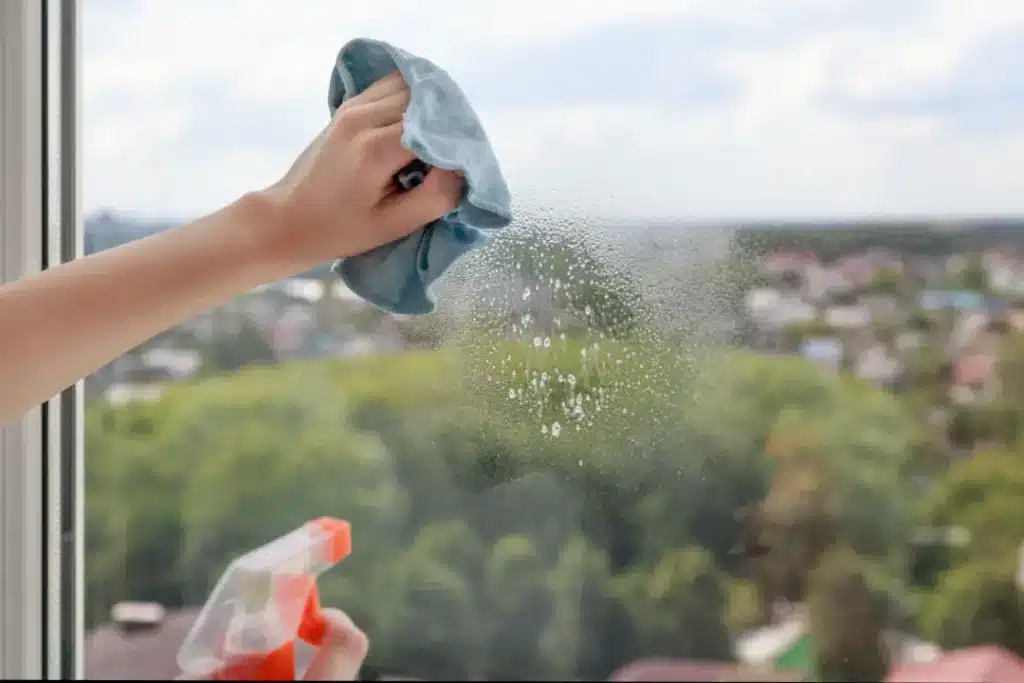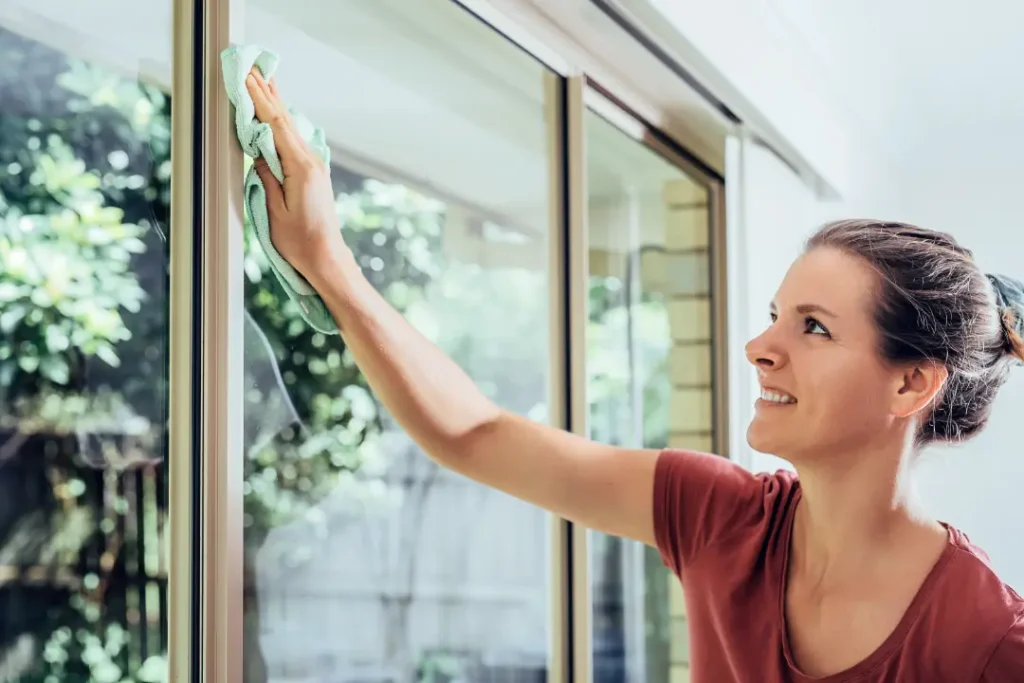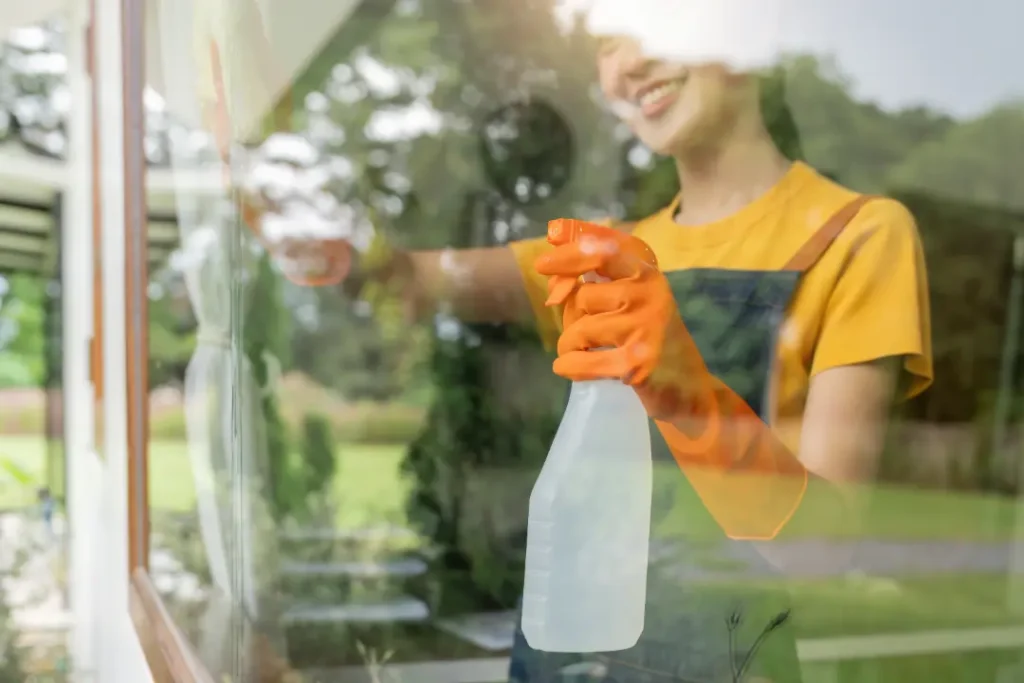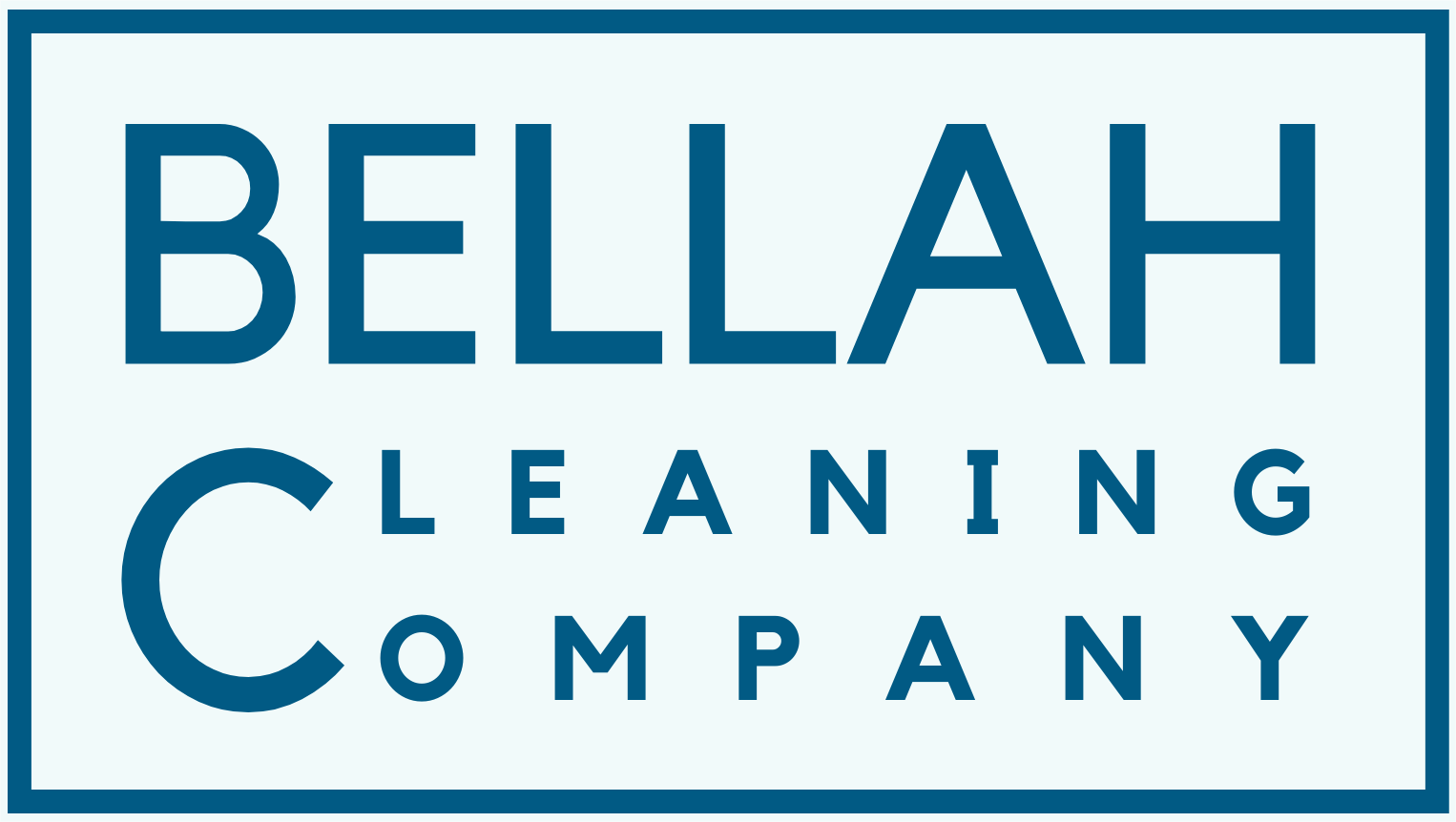Wondering how to clean windows with soap and vinegar for a streak-free shine? This guide will walk you through the steps, necessary materials, how to mix your cleaning solution, and the best techniques for spotless windows. Let’s get started!
Key Takeaways
- Mix equal parts white vinegar and distilled water with a few drops of dish soap to clean windows effectively for a streak-free solution.
- Always prep your windows by dusting sills and frames first and dry them using a microfiber cloth to avoid streaks.
- Clean windows at least twice a year, opting for cloudy days to prevent the cleaning solution from quickly evaporating.
Essential Materials for Cleaning Windows
To achieve the best results when cleaning your windows, it’s important to start by gathering all the necessary materials. Here’s what you’ll need:
- White vinegar: This versatile household staple is essential, as its acetic acid content effectively breaks down dirt and grime.
- Dish soap: When paired with vinegar, it provides superior cleaning power, especially for cutting through grease.
- Distilled water: Using distilled water prevents mineral deposits, ensuring a spotless finish without streaks or spots.
- Spray bottle: A plastic spray bottle is ideal for mixing and applying your cleaning solution with precision and ease.
- Microfiber cloths: These are perfect for delivering a lint-free clean, helping to prevent streaks, and leaving your windows looking pristine.
- Soft scrub brush: Before cleaning the glass, use a soft scrub brush to remove any dust and debris from window sills, ensuring a thorough job.
Each of these items serves a crucial function in the cleaning process. The dish soap works to break down grease, the vinegar dissolves grime, and microfiber cloths ensure a streak-free finish. With the right materials—you’ll find the process not only smoother but also much more effective.

Preparing Your Homemade Window Cleaner
Creating the best homemade window cleaner is quick and simple with a reliable window cleaning solution.
Here’s how to do it:
- Mix equal parts white distilled vinegar and distilled water in your spray bottle.
- For added power, include a few drops of dish soap.
- Lukewarm water helps dissolve the soap more effectively.
Enhance the cleaner’s grease-cutting properties by adding a bit of rubbing alcohol, which also helps the solution evaporate quickly for a streak-free shine. To mask the strong smell of vinegar, add about 10 drops of an essential oil like tea tree or lemon oil.
Your homemade window cleaner is now ready, equipping you to confidently tackle even the dirtiest windows.
Step-by-Step Guide to Cleaning Windows with Soap and Vinegar
Cleaning windows with soap and vinegar is simple, but achieving a streak-free finish requires attention to detail. Start by removing any dust and debris from the window sills and frames with a soft-bristled broom or brush to avoid scratching the glass.
Once the area is prepped, you can begin the cleaning process. The combination of vinegar and soap is powerful—vinegar dissolves grime, soap cuts through grease, and microfiber cloths help ensure a streak-free shine.
Here are the detailed steps.
Spray and Wipe Technique
The spray and wipe technique is simple yet effective. Spray the cleaning solution onto one window at a time to prevent it from drying too quickly. Wipe the window using circular motions with a clean microfiber cloth, covering the entire surface.
For a cleaner finish, try applying the cleaner to a lint-free cloth instead of the glass. This helps protect the surface and ensures a more even application.
After wiping, a dry microfiber cloth buffs the window to a streak-free shine.
Tackling Stubborn Dirt
For stubborn dirt spots, use a separate, clean microfiber cloth to lift and remove the dirt. If streaks remain, repeat the spraying and wiping process until the window is clear.
Avoid abrasive tools like razor blades, which can damage the glass. Rely on your cleaning solution and microfiber cloths instead. Patience and persistence will achieve spotless windows.
Drying for a Streak-Free Finish
Drying is essential for a streak-free finish. Use a soft microfiber cloth to prevent streaks and lint. A squeegee can speed up the process and reduce streaking, while old newspapers also work effectively for some.
Dry the glass in a zig-zag motion to prevent streaks. If drips appear, wipe the edge of the squeegee after each swipe to keep the glass spotless.
For any remaining marks, use a small amount of nonabrasive cleaner and a microfiber cloth.
Tips for Maintaining Clean Windows Longer
Maintaining clean windows involves simple yet effective practices. Regularly dust and clean the window frames and sills to prevent dust accumulation. Washing windows with a microfiber cloth dampened with vinegar solution can break down tough hard water stains.
Avoid cleaning in direct sunlight to prevent streaks, as the solution dries more slowly and evenly. Applying protective films to your windows can reduce the buildup of dirt and grime. Regularly clean window tracks with a brush to keep them operating smoothly for streak free windows.

Safety Considerations When Using Vinegar
Vinegar is a powerful and natural cleaning agent that can be handled safely. Never mix vinegar with chlorine bleach, as it releases harmful chlorine gas. Wear latex-free gloves to protect your hands from irritation.
Vinegar’s acidity can harm electronic devices and certain stone surfaces, so avoid contact. A one-to-one ratio of vinegar and water ensures safe and effective cleaning without damaging surfaces.
How Often Should You Clean Your Windows?
Clean your windows at least twice a year for optimal appearance. Monthly cleaning might be necessary for areas with extreme weather or high pollution. Seasonal changes also influence cleaning frequency, with spring and summer ideal for removing accumulated dirt.
Clean windows before winter to maximize natural light during the darker months, making your home feel brighter. For best results, choose a cloudy day to prevent streaks from the solution from drying too quickly in direct sunlight.
Benefits of Using Soap and Vinegar for Window Cleaning
Using soap and vinegar for window cleaning offers many benefits. This homemade, eco-friendly solution provides a streak-free shine without harsh chemicals. The combination of dish soap and vinegar effectively cuts through grime and grease, leaving windows sparkling clean.
Compared to commercial cleaners, this method is gentler on surfaces and equally effective at removing dirt. Plus, the readily available and inexpensive ingredients make it a cost-effective option for maintaining clean windows.

Get Professional Results with Bellah Cleaning Company
While DIY window cleaning with soap and vinegar can achieve decent results, nothing compares to the streak-free finish and thoroughness of professional services. Offering window cleaning services in Southlake, Colleyville, Keller, and the broader Dallas/Fort Worth areas, Bellah Cleaning Company uses industry-grade tools and techniques to ensure your windows not only shine but remain clear of mold, dirt, and grime. Our expertise goes beyond just cleaning glass – we tackle those hard-to-reach spots, ensuring every window frame, sill, and pane is spotless.
Attempting to clean double-pane windows or remove mold between panes can be tricky, and DIY methods often don’t address the root causes. At Bellah, we specialize in tackling these more challenging problems. We ensure your windows stay crystal clear while also preventing mold from returning, saving you time, frustration, and potential long-term damage.
Why struggle with streaks or mold when you can trust the professionals? Contact Bellah Cleaning Company today for a hassle-free, expert solution that leaves your windows gleaming and your home healthier. Book now and enjoy a crystal-clear view!
Frequently Asked Questions
What ingredients are needed for a homemade window cleaner?
To make a homemade window cleaner, grab some white vinegar, dish soap, and distilled water and mix it all in a spray bottle. It’s easy peasy!
How often should I clean my windows?
You should aim to clean your windows at least twice a year, but if you live in a place with rough weather or lots of pollution, do it more often! Keeping those panes clear makes a big difference.
Can vinegar damage surfaces?
Vinegar can damage surfaces like stone and electronics because of its acidity. So, it’s best to use it carefully!
Conclusion
Cleaning your windows with soap and vinegar is an effective and budget-friendly way to achieve a streak-free shine. By gathering the right materials, using a powerful homemade cleaner, and following a precise cleaning process, you can maintain clear and beautiful windows all year round. However, while regular maintenance helps, some tasks—like dealing with hard-to-reach spots or stubborn mold—may require expert care.Our professional team delivers exceptional window cleaning services, ensuring your windows stay spotless, free from mold, and perfectly maintained. Skip the hassle and enjoy pristine results every time with our trusted expertise. Call Bellah Cleaning Company today and let us handle your window cleaning.
